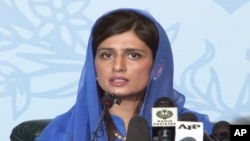Pakistan Foreign Minister Hina Rabbani Khar says that the ongoing parliamentary review of her country’s “complex” ties with the United States may be painstakingly slow, but it will lay a lasting foundation for the future. Her remarks came as the parliament adjourned its joint session for a week to let lawmakers hammer out differences over a set of recommendations to reset Islamabad’s relations with Washington and its Western allies.
The long-awaited parliamentary debate to review Pakistan’s relationship with the United States began early this week. But the meeting failed to see a substantive discussion on the draft recommendations because the opposition demanded the removal of some controversial provisions.
Lawmaker Ayaz Amir represents the main opposition party, the Pakistan Muslim League-N, which is headed by former prime minister Nawaz Sharif.
“Parliament has been almost paralyzed or stalled for over a week. The recommendations have been tabled but a meaningful debate has not even begun. If anything is having an influence it is what they (lawmakers) perceived to be public opinion, and that is creating a problem,” Amir said.
The parliament adjourned its session on Friday for a week after the ruling coalition headed by the Pakistan People’s Party (PPP) agreed to review the draft recommendations to address the opposition’s concerns.
Foreign Minister Khar told reporters that her country attaches immense importance to ties with the United States and believes the parliamentary process will give those ties the Pakistani people's stamp of approval.
“With our international interlocutors and our friends, we have also maintained that dictatorships and quick decisions can offer you may be quick solutions but not lasting solutions, that democracy is more complex and may be more painstaking and may be (a) more even time consuming process. But it gives you results, which are time tested, which are lasting," Khar said.
She was apparently referring to former military ruler Pervez Musharraf, who was Pakistan's president when it joined the U.S.-led invasion of Afghanistan targeting the Taliban and al-Qaida.
The Pakistani government suspended its anti-terrorism cooperation with the United States to protest last November's killing of 24 of its soldiers in a deadly cross-border air strike by NATO helicopters.
Islamabad closed land routes for convoys carrying “non-lethal” supplies to international forces in Afghanistan. It also expelled Americans from an airbase being used for drone strikes against suspected hideouts inside Pakistan and asked the parliament to revise the terms of engagement with the United States and NATO.
The draft recommendations presented to parliament call on the Pakistani government to seek an unconditional apology for the November incident, and for an end to the U.S. drone strikes against suspected militants in Pakistan.
The draft also puts forward conditions for reopening the NATO supply routes. But Islamic parties and hardliners in Pakistan are warning the government against restoring those supply lines.
Lawmaker Ayaz Amir says that a unanimous parliamentary endorsement of the new terms of engagement with Washington is essential to prevent future problems.
“The NATO supply lines, they run across the entire country, and there have been attacks, they have been hit, they have been burnt. So if there is a recrudescence of such events, then that is not going to be good for Pakistan because the law and order situation, already not very ideal or good, is going to (get) worse,” Amir said.
Pakistani militants have attacked NATO convoys in the past, and it is feared that religious parties could encourage future violence.
President Barack Obama and Prime Minister Yousuf Raza Gilani held talks this week on the sidelines of a nuclear security summit in South Korea. A day later, top American military commanders visited Pakistan for high-level discussions. It is not clear what transpired in these meetings. But observers see the contacts as signs of improving ties.
News
Pakistanis Debate New Terms for Relationship with US
- By Ayaz Gul




